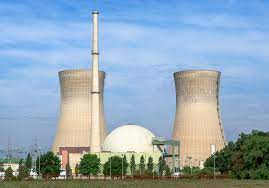Nuclear power plants are an important source of electricity. They generate power through nuclear reactions that release a large amount of energy in the form of heat. This heat is then used to generate steam that drives turbines and ultimately produces electricity. Despite their advantages, nuclear power plants also have their challenges and controversies that need to be addressed.

Table of Contents
Advantages of Nuclear Power Plants
- Efficiency of Electricity Generation: Nuclear power plants are highly efficient in generating electricity. They require a small amount of fuel, usually uranium, to produce large amounts of electricity. This makes them an ideal choice for countries with limited natural resources or those looking to reduce their dependence on fossil fuels.
- Low Carbon Emissions: Unlike fossil fuel-based power plants, nuclear power plants produce very low levels of carbon emissions. This makes them an environmentally friendly option for electricity generation and a potential solution to global climate change.
- Energy Security and Independence: Nuclear power plants provide energy security and independence to countries that have no or limited access to fossil fuels. They are a reliable source of energy and can help reduce dependence on imported oil and gas.
Challenges of Nuclear Power Plants
- Safety Concerns: Safety is one of the most significant challenges facing nuclear power plants. Accidents like the Chernobyl and Fukushima disasters have shown the potential for devastating consequences in the event of a nuclear accident. The risk of radiation exposure to workers and surrounding communities is a serious concern.
- Radioactive Waste Disposal: Nuclear power plants produce radioactive waste that is dangerous to human health and the environment. This waste must be safely stored and managed for thousands of years. The disposal of nuclear waste poses a significant challenge due to the risk of contamination and the long-term storage required.
- Cost and Economics: Nuclear power plants are expensive to build and operate. The capital investment required to construct nuclear power plants is enormous, and the operating expenses are also high. In addition, the competition from renewable energy sources like solar and wind is increasing, making it difficult for nuclear power plants to compete economically.
Regulations and Safety Measures
- Regulatory Standards for Nuclear Power Plants: Nuclear power plants are subject to strict regulations and safety standards. Regulatory bodies like the International Atomic Energy Agency (IAEA) and the Nuclear Regulatory Commission (NRC) oversee the safety and security of nuclear power plants worldwide.
- Safety Measures and Inspections: Nuclear power plants must take extensive safety measures to protect their workers and surrounding communities. Regular inspections and audits are conducted to ensure compliance with safety regulations, and emergency preparedness and response plans are in place to respond to any accidents or incidents.
Future Outlook for Nuclear Power Plants
Despite their challenges and controversies, nuclear power plants remain an essential source of electricity for many countries. The development of new technologies like advanced nuclear reactors has the potential to address some of the safety and economic concerns associated with nuclear power plants. These reactors are designed to be safer, more efficient, and even to use nuclear waste as fuel.
Major Nuclear Sites in India
- Tarapur Atomic Power Station (Maharashtra)
- Rawatbhata Atomic Power Station (Rajasthan)
- Kaiga Atomic Power Station (Karnataka)
- Kakrapar Atomic Power Station (Gujarat)
- Kudankulam Nuclear Power Plant (Tamil Nadu)
- Narora Atomic Power Station (Uttar Pradesh)
- Rajasthan Atomic Power Station (Rajasthan)
List of Countries with Largest Nuclear Power Generation capacity
- United States – 93.5 GW
- France – 63.2 GW
- China – 52.9 GW
- Japan – 43.5 GW
- Russia – 28.5 GW
- South Korea – 24.8 GW
- Canada – 13.5 GW
- Ukraine – 13.3 GW
- United Kingdom – 9.2 GW
- Germany – 8.1 GW
Conclusion
Nuclear power plants provide a reliable and efficient source of electricity for many countries. However, the safety and environmental concerns associated with nuclear power cannot be ignored. It is essential to continue investing in safety measures, regulatory standards, and new technologies to ensure the safe and sustainable operation of nuclear power plants.
Important Links